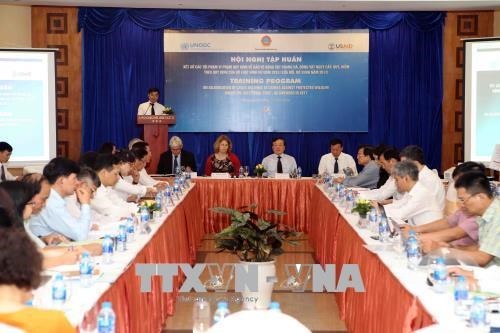The event was jointly held by the US Agency for International Development (USAID), the Vietnam Supreme People’s Court, and the United Nations Office on Drugs and Crime.
It offered a chance for judges to contribute their ideas to a draft resolution of the Council of Judges on guiding the implementation of new wildlife-related regulations of the amended Penal Code.
    |
 |
|
An overview of the training program seeking to improve the capacity of judges and people’s court personnel for judging cases related to crimes against protected wildlife |
Chief Justice of the Supreme People’s Court Nguyen Hoa Binh said new clauses and heavier penalties of the 2015 Penal Code (amended in 2017) show Vietnam’s stronger resolve to fight crimes against wildlife, and its commitment to implementing the Convention on International Trade in Endangered Species of Wild Fauna and Flora (CITES).
Delegates to the event delivered reports on and discussed violations related to wild animals in Vietnam, while sharing difficulties in prosecuting and judging several related cases in the country.
Pham Quy Ty, former Deputy Minister of Justice, said that as the trading of wild animals brings about high profits, violators use a lot of subtle measures to avoid inspections of authorized offices.
Hiring transporters is the most common way, so authorized offices often arrest only transporters, not instigators, leading to the suspension of many cases, Ty noted.
He stressed the need for the Supreme People’s Court to soon promulgate the Council of Judges’ resolution guiding the implementation of Articles 234 and 244 of the 2015 Penal Code on how to differentiate an animal entity and parts of animal body.
Nguyen Chi Cong, deputy head of the Department of Legislation and Science Management under the Supreme People’s Court, cited the court’s statistics as saying that the court handled 40 cases related the smuggling of wild animals with 60 defendants involved in 2015. The figures rose to 92 cases involving 130 defendants in 2016 and 99 cases and 149 defendants in 2017. Of the total, 207 cases with 303 defendants involved went on trial, equal to 89.6 percent.
In the past three years, financial punishments were imposed on two persons, while 16 received non-custodial re-education, 181 got a suspended sentence, 96 were sentenced to below 3 years in prison, and eight got sentences of 3-7 years in jail, Cong stated.
Katelin Maher from the USAID in Vietnam said that the training program is the follow-up of assistance provided by the USAID for the Supreme People’s Court through its Governance for Inclusive Growth program (GIG) to determine challenges and gather responses on judgment of wildlife-related cases.
Through the GIG program, USAID will continue providing technical assistance for the Vietnamese Government, National Assembly and judicial sector, and coordinating with the business community and civic organizations to support sustainable economic growth in the country, she added.
Source: VNA